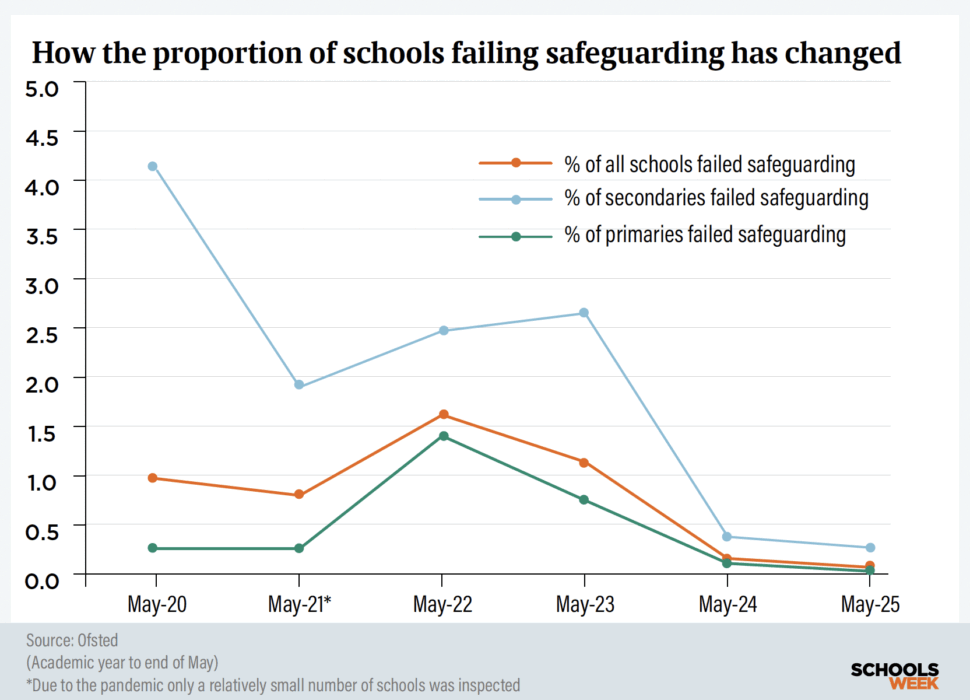Three of the more than 4,000 schools inspected so far this year have failed Ofsted safeguarding checks, raising some concerns that inspectors may be missing serious issues.
While the number failing to meet the requirements has always been small, it has decreased markedly since the death of headteacher Ruth Perry in January 2023.
What the data shows
Twenty-seven schools out of more than 2,700 inspected in 2020 were judged to have safeguarding practices that were “not effective” (1 per cent).
After the pandemic, the proportion rose to about 1.6 per cent, last year dropping to 0.16 per cent and 0.07 this year.
Ofsted has inspected more than 3,370 primary schools this year, but only one has “not met” safeguarding requirements, equating to just 0.03 per cent.
In 2020, 4.1 per cent of secondaries failed safeguarding, falling to 2.65 per cent in 2023.
So far this year, two of 731 secondaries inspected have failed safeguarding (0.27 per cent).
More generous inspectors?
“If inspection works at all you’d expect a gradual fall in how many schools fail safeguarding,” said Adrian Gray, a former senior HMI. He said it was “rational” to “expect a peak after Covid”.
“ But I am not convinced 99.9 per cent of primary schools are great at safeguarding. Would you believe a garage that certified 99.9 per cent of cars it tested for MoT? No, you would conclude either there was something wrong with the test, or they were not being robust.”
Gray suggested that inspectors could “have lost their nerve” following Perry’s suicide. A coroner ruled an Ofsted inspection contributed to her death.

The drop in safeguarding failures also follows a similar shift on overall grades.
In 2023-24, the final year before headline grades were abolished, just 16 per cent of schools were rated below ‘good’ – the lowest ever, and down from 32 per cent in 2021-22.
Perry’s school, Caversham Primary in Reading, was downgraded from “good” to “inadequate” after inspectors raised concerns over safeguarding.
If a school failed safeguarding, it would be rated ‘inadequate’ overall.
Ofsted changes effect?
Policy changes are another factor. As of mid-2023, schools graded ‘inadequate’ overall because of ineffective safeguarding, but with ‘good’ or better in all other areas, were re-inspected within three months. Ofsted said this gave them a chance to make improvements, although this happened “rarely”.
A new “suspend and return” policy introduced last September lets inspectors pause an inspection to allow a school to resolve safeguarding, “where that is the only issue in the school”.
But Ofsted told Schools Week it was “extremely rare” that a school had ineffective safeguarding without any other issues and so this was unlikely to have a significant impact on figures.
Perry case ‘raised awareness’
Steven Isaacs, a school safeguarding consultant, said the Caversham case led to leaders being “more in tune with the expectations and the requirements. People have realised how serious it is, what kind of effect it can have if it does go horribly wrong.”
He witnessed a recent inspection where checks were “more rigorous than ever”.
Pepe Di’Iasio, the general secretary of the leaders’ union ASCL, added the rarity of “ineffective” safeguarding judgments was “testament to the work of schools in getting right this vital area. It is not surprising few fail … [they] are sharply focused on making sure they keep pupils and students safe.”
‘Schools getting it right’
Ella Savell-Boss, a safeguarding trainer and consultant who works with schools, said there had been “a real shift in recent years towards embedding safeguarding into everyday culture”, with many leaders having a “much more sophisticated understanding of what good safeguarding looks like in practice”.
Gray also said schools could have just “got better at giving inspectors what they want”.
But Daniel Kebede, the general secretary of the National Education Union, said the previous Ofsted framework was “overly punitive”. It was now “far more sensible and accurately reflects” the sector.
Grades ‘fluctuate year on year’
An Ofsted spokesperson said the grade profile of schools inspected “fluctuates year on year”. But the proportion of primaries failing was “low and always has been”.
Sir Martyn Oliver, the chief inspector, also said this week safeguarding was something schools “prioritise perhaps above everything else. Nothing infuriates me more than glib commentary about schools falling short on inspection because of duff paperwork – or schools pulling the wool over inspectors’ eyes because their paperwork is on point.”















Your thoughts